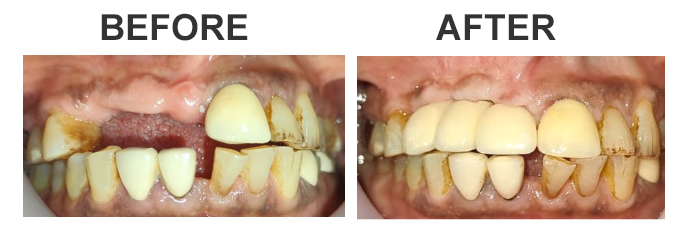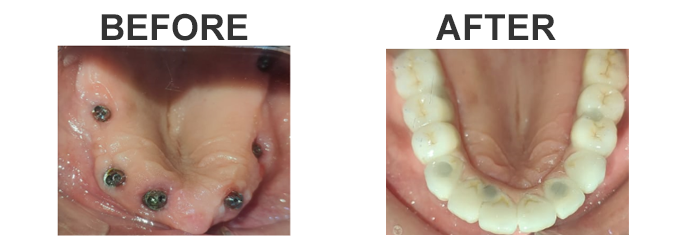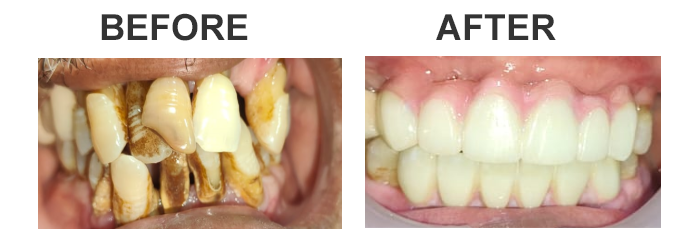Gum Disease Ahmedabad

What is Gum Disease?
Gum disease is an inflammation of the gums (tissues surround and support your teeth). It is a major cause of tooth loss in adults. Because gum disease is usually painless, you may not know you have it that’s a main reason for ignorance.
Who can have Gum Disease?


It’s a myth that Gum Disease happens to people of your grandparent’s age! Teens can also get gum disease, and it can cause problems from simply embarrassing like bad breath to the serious like tooth loss which is both embarrassing and serious!
Types of Gum Disease
Gingivitis
It means ‘inflammation of the gums’. Gums around the teeth become red and swollen. Often the swollen gums bleed when they are brushed during cleaning. It’s often caused by inadequate oral hygiene. Gingivitis is reversible with professional treatment and good oral home care.

Chronic Periodontitis
Long standing gingivitis can turn into periodontal disease causes loosing teeth and it may eventually fall out. Progression of disease results in inflammation within the supporting tissues of the teeth, progressive attachment and bone loss. This is the most frequently occurring form of periodontitis and is characterized by pocket formation and/or recession of the gingiva.
Forms of Periodontitis

- Aggressive periodontitis
Occurs in patients who are otherwise clinically healthy. Common features include rapid attachment loss and bone destruction and familial aggregation. Localized aggressive periodontitis is found in teenagers and young adults and mainly affects the first molars and incisors. It is characterized by the severe loss of alveolar bone.
Forms of Periodontitis

- Periodontitis
As a manifestation of systemic diseases often begins at a young age.
Forms of Periodontitis

- Periodontal Disease in Women
Women are especially susceptible to periodontal disease at various stages of life like puberty, menstruation, pregnancy and menopause. This can exaggerate the gum tissues react to plaque. Gums may become red, tender, swollen and most likely to bleed.
Forms of Periodontitis

- Necrotizing periodontal disease
Is an infection characterized by necrosis of gingival tissues. These lesions are most commonly observed in individuals with systemic conditions such as HIV infection, malnutrition and immunosuppression.
Gum Disease and Systemic Connection
Heart Disease
A study shown that the bacteria and inflammatory protein cause periodontitis is enter into blood stream and cause the thickening of blood vessels wall commonly seen in heart disease and stroke.
Cancer
Chronic inflammation has been the rationale behind the association looking both at specific types of cancers and periodontal disease. Oral cancer has shown an increased risk of oral cancer with periodontal disease or tooth loss.
Respiratory infection
Is thought to rely in part on the aspiration of oropharyngeal flora into the lower respiratory tract and failure of host defense mechanisms to eliminate the contaminating bacteria, which then multiply to cause infection. It has been suggested that dental plaque may act as a reservoir of respiratory pathogens, especially in patients with periodontal disease. Increased risk of pneumonia and COPD.
Diabetes
According to the American Diabetes Association, people with diabetes are at higher risk for gum disease (severe gum infection with bone destruction). Gum disease can also affect the body’s blood sugar control. People with diabetes can have tooth and gum problems more often if their blood glucose stays high. High blood glucose can make tooth and gum problems worse. You can even lose your teeth.
Our Team

Dr. Sayma Memon
Diplomate, American Board of PeriodontologyMDS, Houston, USABDS, India

Team
Internationally trained and experienced Dentist in Ahmedabad 100% women only staff.
Syed Wazir, Dubai
Bakul Patel, USA
Ratings & Reviews on Google
Ahan Sahoo

“Ahan Sahoo gives US Dental Clinic – Dental Implants Hospital in Ahmedabad 5 stars rating”
faraz 15105

“One of the best dentale facilities ! Very satisfied with the treatment One of the best dentale facilities ! Very satisfied with the treatment”
Ayaan Shaikh

“Wonderful experience, professional kind and informative staff that let me know of the prodecures taking place were quick efficient and skilled.”
Alina Shaikh

“I had a really had a positive experience at this clinic. The dentist really made an effort to explain why my condition had occurred and what she was…”







